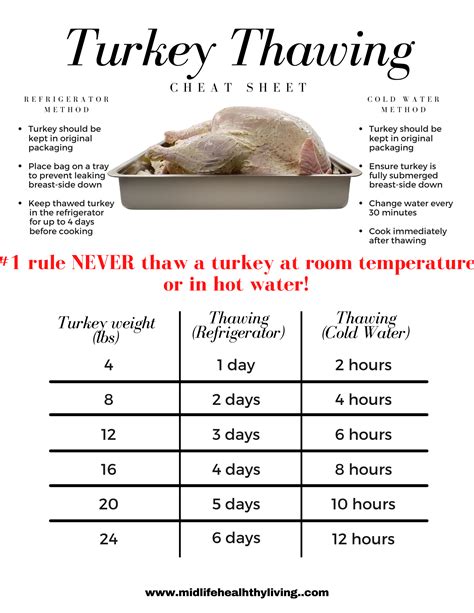How to Thaw a Turkey: A Safe and Simple Guide
Thawing a turkey properly is crucial for food safety and ensuring a delicious Thanksgiving or holiday meal. A frozen turkey needs ample time to thaw completely before cooking, preventing uneven cooking and potential bacterial growth. This comprehensive guide will walk you through the safest and most efficient methods, helping you avoid common mistakes and ensuring a perfectly thawed turkey every time.
Understanding Thawing Times
Before we dive into the methods, it's vital to understand that thawing time depends heavily on the turkey's weight. A smaller turkey will thaw much faster than a larger one. Always check the weight of your turkey and adjust the thawing time accordingly. Here's a general guideline:
- 4-12 pounds: Allow approximately 24 hours in the refrigerator.
- 12-16 pounds: Allow approximately 2-3 days in the refrigerator.
- 16-20 pounds: Allow approximately 3-4 days in the refrigerator.
- Over 20 pounds: Allow approximately 4-5 days in the refrigerator.
Important Note: These are minimum times. It's always better to err on the side of caution and allow for extra time.
Safe Thawing Methods
There are three primary safe methods for thawing a turkey:
1. Refrigerator Thawing (Safest Method)
This is the safest and recommended method. It's slow and steady, minimizing the risk of bacterial growth.
- Place the turkey: Place the turkey in its original packaging (or a leak-proof bag) on a tray in the refrigerator. This prevents any juices from contaminating other foods.
- Allow ample time: Refer to the thawing time guidelines above. The lower temperature consistently inhibits bacterial growth.
- Safety check: Ensure the turkey is completely thawed before cooking. The interior should be uniformly soft and pliable, with no frozen areas remaining.
2. Cold Water Thawing (Faster Method)
This method is faster than refrigerator thawing but requires constant supervision.
- Submerge the turkey: Place the turkey in its original packaging (or a leak-proof bag) in a large container filled with cold tap water. Change the water every 30 minutes to ensure the temperature remains consistently cold.
- Thawing time: The rule of thumb is approximately 30 minutes per pound. For example, a 10-pound turkey would take about 5 hours.
- Constant monitoring: Never leave the turkey unattended during this process.
- Safety precautions: Use a clean container and ensure the water remains cold throughout.
3. Microwave Thawing (Quickest, but Least Recommended)
This is the quickest method, but it's less recommended due to uneven thawing and the potential for cooking parts of the turkey while others remain frozen.
- Check your microwave: Consult your microwave's manual for specific instructions on thawing a turkey.
- Defrost setting: Use the defrost setting if your microwave has one.
- Turn and rotate: Turn and rotate the turkey frequently to ensure even thawing.
- Cook immediately: Once thawed, cook the turkey immediately.
What NOT to Do
Avoid these methods, as they pose significant food safety risks:
- Thawing at room temperature: This is extremely dangerous and can lead to rapid bacterial growth.
- Thawing in hot water: This can cause uneven thawing and potentially cook parts of the turkey while others remain frozen.
After Thawing
Once your turkey is fully thawed, ensure you cook it immediately. Do not refreeze a thawed turkey.
By following these guidelines, you can ensure a safe and delicious holiday meal. Remember, safety is paramount! Always prioritize safe thawing methods and adhere to the recommended thawing times. Happy cooking!
